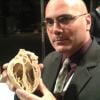By Dave Fornell, editor of DAIC Magazine
The key take away messages from the 26th annual Transcatheter Cardiovascular Therapeutics (TCT) scientific symposium were bioresorable stents and transcatheter valve technologies will likely become primary interventional tools in the near future. These two areas were among the hottest topics of discussion in sessions, live case presentations, late-breaking trials and on the expo floor. The latest trial data for both technologies presented at TCT continue to show extremely positive trends in patient outcomes that are equal or better than current standards of therapy.
Key news on bioresorbable stents at the meeting came from the ABSORB II Trial, which compared the Abbott Absorb BVS drug-eluting bioresorbable stent to the company's market-leading Xience metalic drug-eluting stent. At one year the clinical outcomes were the same, but the bioresorbable stent patients reported a significantly lower incidence of angina. This opens up an entirely new avenue of research into these devices and their potential benefits. This inspired changes in the upcoming ABSORB IV trial to examine angina outcomes specifically. Watch a video discussing these findings and the future of bioresorbable stents.
There were several trial presentations of transcatheter aortic valve replacement (TAVR), including long-term outcomes and economic impact of using these devices (see news items below). One of the key issues with TAVR has been stroke rates higher than surgical valve replacements, and three start-up companies showed cerebral embolic protection devices at TCT. The biggest news in this area was from a trial involving the Claret device, which resulted in a lower stroke rate. Here is an article overview of the TAVR embolic protection devices in development.
I attended one packed, standing-room-only session on transcatheter mitral valve replacement devices in development. This is definitely the next technology area to watch, as I suspect this will become the next major technology highlighted at future ACC and TCT meetings.
I highlighted the details of two technologies that may offer paradigm shifts in interventional cardiology in the next couple years in a video about intravascular imaging to detect vulnerable plaque, and a video about CT-FFR.
There were many cutting-edge technologies highlighted at TCT. I offer a roundup of these in my video "DAIC Editor's Choice of the Most Innovative New Technologies at TCT 2014."



 December 24, 2025
December 24, 2025 









